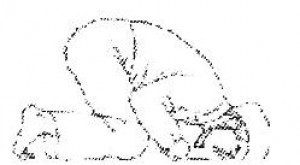How prayer must be performed
Tenaei hatefila תְּנָאֵי הַתְּפִלָּה
According to our prophets and our teachers, prayer that is performed as a mere ritual has no meaning, only the prayer that is done sincerely has meaning. God, who created our hearts and who knows our thoughts, does not need our prayers, God does not judge us on the base of our external behavior, but He judges us on the base of our internal behavior, which means he judges according to our thoughts and our mind as it is written:
For man looketh on the outward appearance, but יהוה looketh on the heart. (1Sam 16: 7)
Our teachers of faith express this truth with the following proverb:
Prayer without a lesson is like a body without soul.
Better is not to pray than to pray only formally, hypocritically and insincerely. One should not attend the kenasa if he/she is not able to be fully concentrated on prayer and sincerely confess his/her own feelings to God. One who prays without concentration and a sincere heart, he/she sins, because he/she cheats other praying people and therefore the one who does not pray, he/she at least don’t sin and cheat.

During prayer one must be pious, fully concentrated and he/she must bow before God in profound reverence. One must not forget that he/she stands before the King of Heaven, who knows everything about our thoughts. We do not pray for God, but for ourselves.
Prayer brings us great benefit if it comes from the heart. In prayer we commemorate the magnitude of Creator and helps us in spiritual meditation. It gives us the opportunity to recognize our own insignificance and mortality. In this way, prayer leads us to the recognition of our imperfections and tames our arrogance, softens our hearts, helps us to improve our depraved morals and strengthens our hearts in faith, hope and love.
Pray is mentioned here by the Prophet Isaiah:
When ye come to appear before Me, who hath required this at your hand, to trample My courts? (Isa 1:12)
And when ye spread forth your hands, I will hide Mine eyes from you; yea, when ye make many prayers, I will not hear; your hands are full of blood. Wash you, make you clean, put away the evil of your doings from before Mine eyes, cease to do evil; Learn to do well; seek justice, relieve the oppressed, judge the fatherless, plead for the widow. (Isa 1:15-17)
Here we can see that prayer without good intention is not accepted by God, prayer must be accompanied by good intentions. In these verses, the prophet Isaiah speaks about sincere prayer to his contemporaries:
And יהוה said: Forasmuch as this people draw near and with their mouth and with their lips do honour Me, but have removed their heart far from Me, and their fear of Me is a commandment of men learned by rote; Therefore, behold, I will again do a marvellous work among this people, even a marvellous work and a wonder; and the wisdom of their wise men shall perish, and the prudence of their prudent men shall be hid. (Isa 29: 13-14)
King David informs us about the benefits of prayers performed sincerely:
יהוה is nigh unto all them that call upon Him, to all that call upon Him in truth. He will fulfil the desire of them that fear Him; He also will hear their cry, and will save them. (Psalm 145: 18-19)
From the mentioned verses of Holy Scripture we can see that the main roles in prayer are: attention, piousness and concentration of mind. More important is the quality of prayer, not quantity. A short but sincere prayer, uttered with full concentration has greater importance and God will find greater delight in this prayer than a prayer that is long, insincere, mechanical and spoken without internal concentration.
Therefore, it is better to pray briefly, but sincerely and intently.
So the proverb tells us:
It is better to pray little and intently than to pray a lot without concentration.
Attention and concentration of mind is possible only when one understands the meaning of what he/she is saying. Therefore, it is necessary to understand the meaning of recited prayers. ¹)
Unfortunately for us, we have very limited time for the teaching of biblical Hebrew, so only a few people master Biblical Hebrew perfectly and only a small number of people are able fully understand the meaning of our prayers that are in this language. (Written in year 1890)
¹) For this reason the author of this book compiled a short prayer, which will be placed at the end of the book, together with English translation.